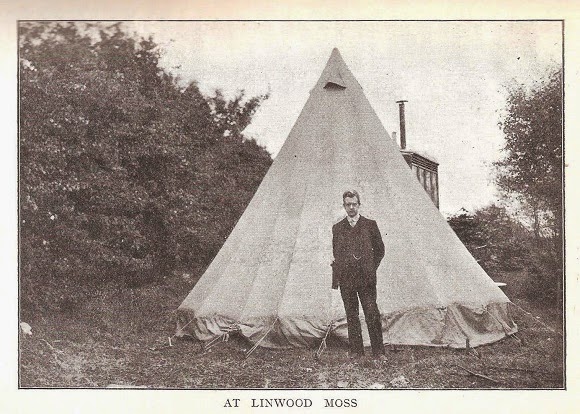Earlier this year I came across for the first time the curious Scottish character of Dugald Semple. I am amazed I came across him at all since he seems, like most live-minded advocates of a less industrious life, to have been relegated to library archives, if not to the burning scrap heap itself.
Semple (1884-1964) lived at various times in Bridge of Weir, Linwood Moss, Beith, and Fairlie where he had some correspondence with, and influence on, a young Kenneth White. Semple became known as a result of his living in a 'wheelhouse' (an old omnibus) on Linwood Moss for a year when in his early twenties. It was his Thoreauvian attempt to 'live deliberately' and to question the seemingly self-detructive tendencies and conventions of a slipping society.
Semple was, as I am too, convinced that the human had lost his way, had become so confused (eliding the illusory me with the I) that he had now become something else, that was emphatically not human. The word human, indeed, comes from the Latin humus meaning soil, and since man has degraded the earth's soils to the point of death, one could say, from a simply linguistic viewpoint, that the word human is no longer applicable. Soil and soul, the title of another significant book in the simple life canon by the thoughtful Scot Alistair McIntosh, tells us of how we have estranged ourselves from our selves; how by way of seduction and progress and the dogma of religion we have become the small ego-bound 'me' instead of the wide, all seeing I. Religion, whether you like or not, is the deep interconnecting forces that binds all sentient and non-sentient things together. Whether the Tao, the Force, the unseen, or the invisible, it is there and connects. How do you think you breathe? if not for the truth that your self is larger than you think it is? As an open flowing system, the world flows right through us as we flow through it. World, then, becomes a reciprocal process, not a product or commodity to be exploited. Spit on the earth, goes an old Amerindian saying, and of course you spit on your self. But we have lost our way. We are actively encouraged to 'spit on the earth' as it contributes towards GDP. Progress has advanced us beyond (not in any transcendental way, but simply in an accumulative physical one) the human into the post-human. And, as the word 'posthumous' suggests, as the proliferation of zombie films do too, we are the walking dead. We are not alive, not awake, not aware. We go about our busyness, unthinkingly, concerned only with our small self. Man has lost his humanity, sold it out in most cases to the lowest bidder (about 7 quid an hour), for humans do not kill, they do not deceive, they do not degrade, and they waste very little. The death of the human is upon us, that much is clear. But it needn't be that way. The simple life can return us to the source, can wake us up from this primitive accumulating slumber we are immersed in. Stillness, and contemplation, as the anti-thesis to business (and the state of being busy) is the way to the Way. Solitude and silence, the opening of the transcendent door.
For the butterfly has leisure to love the lotus, not the bee busily storing honey. [Rabindranath Tagore]

